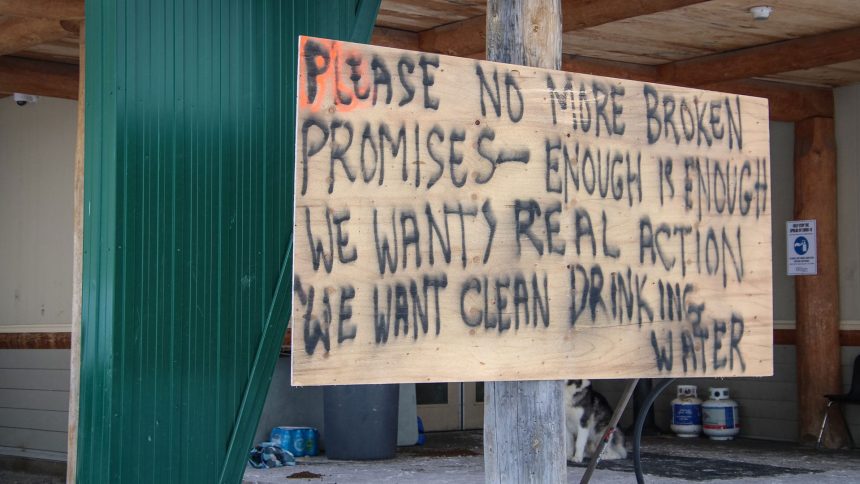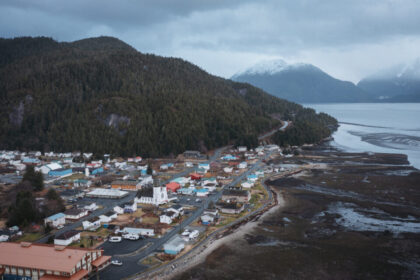The head of the Chiefs of Ontario (COO) has blunt words for Ontario and Alberta, who this week called on the federal government to not reintroduce legislation that would mandate safe drinking water in First Nation communities. “Ontario and Alberta’s opposition to Bill C-61 is not only disappointing, it is a direct attack on the rights, health, and safety of First Nations,” COO Regional Chief Abram Benedict told APTN News in a statement. “This legislation was developed to ensure that our communities finally have access to clean, safe drinking water, a basic human right that far too many have been denied.” He reiterated that Ontario has the highest number of long-term drinking water advisories in the country and gave the example of Neskantaga First Nation whose members have lived under a boil water advisory for over 30 years, calling it “a national failure that must be addressed.” “We fully support the federal government’s commitment to reintroduce Bill C-61, and we urge Prime Minister [Mark] Carney and Minister [Mandy] Gull-Masty to move forward without hesitation and reject any attempt to delay or weaken this legislation. Our communities cannot afford to wait any longer,” Benedict said. Bill C-61, as well as other pieces of legislation died on the order paper when Parliament was prorogued in March. It was introduced in the House of Commons on December 11, 2023, and it had passed Second Reading and was under review by the Standing Committee on Indigenous and Northern Affairs. The bill, officially called the First Nations Clean Water Act aimed at ensuring First Nations communities have safe and reliable drinking water and wastewater services. It also aimed to affirm First Nations’ inherent right to self-government and jurisdiction over water resources on their lands. The ministers of Environment for Alberta and Ontario kicked off renewed debate on the legislation, writing a joint letter Monday to their new federal counterpart Julie Debrusin. They asked that the new Liberal government refrain from reintroducing the legislation, saying it will “undermine competitiveness, and delay project development.” Both Ontario and Alberta want to forge ahead with resource development projects like Ontario’s Ring of Fire and an “energy corridor” and future pipeline projects in Alberta. Their statement, posted online, doesn’t explain how the proposed legislation would affect those issues or trample on their jurisdiction. According to the press secretary for Alberta Environment Minister Rebecca Shulz, the federal government needs to step up and ensure that all First Nations communities have access to safe and clean drinking water, but defends their stance saying the bill is “deeply flawed and should be scrapped.” The federal government needs to put forward legislation based on meaningful consultation with provinces and Indigenous groups, and that will actually address First Nations’ water needs,” said Ryan Fournier. Fournier said that as written, Bill C-61 would “create more confusion about federal roles and responsibilities and give sweeping new powers to federal ministers.” “This legislation was created without meaningful engagement with Alberta’s government and First Nations. Notably, it has been opposed by chiefs from Treaty 6,7 and 8, who say the federal government drafted it while ignoring their requests for a meeting.” In response to the statement from the provinces, the Blackfoot Confederacy in southern Alberta said that Bill C-61 “poses absolutely no barriers to competitiveness or development” and that it would “confirm the human right of First Nations to safe drinking water, sufficient waters supplies and the right to govern water on reserve lands.” “Kainai, Siksika, and Piikani Nations of the Blackfoot Confederacy are outraged at the Government of Alberta’s morally bankrupt opposition to the rights of First Nations to access safe and sufficient water supplies,” a statement from the Confederacy said. “The Government of Alberta’s motives are unknown, but what is not in doubt is that Premier Smith’s government opposes First Nations’ rights to safe and sufficient water supplies – which is utterly reprehensible.” The Blackfoot Nations also reminded the prime minister of his commitment in the throne speech. “The government will be a reliable partner to Indigenous Peoples, upholding its fundamental commitment to advancing reconciliation,” it said. “Failing to reintroduce the First Nations Clean Water Act would be a profound and intentional act against the human rights of First Nations and fundamentally inconsistent with the Prime Minister’s stated commitment to reconciliation. We call on the Prime Minister to confirm that the First Nations Clean Water Act will be reintroduced as soon as possible,” the Confederacy said. A spokesperson for Indigenous Services Minister Mandy Gull-Masty agreed saying “everyone in Canada should have access to safe and clean drinking water.” “That’s why our new government has committed to introduce and pass legislation that affirms First Nations have a human right to clean drinking water. To be clear – we intend to introduce this legislation this fall to advance this important commitment,” according to Livi McElrea. Water legislation versus a push to build, build, build Green Party Leader Elizabeth May speaks with reporters in the Foyer of the House of Commons, Thursday, May 29, 2025 in Ottawa. Photo: Adrian Wyld/The Canadian Press. Some of the outstanding concerns about the bill from First Nations included the lack of money identified in the bill to fix existing water systems which are aging and in need replacement. There is also the issue of recruitment and training of water operators. First Nations spoke of wanting upstream control of their water sources to protect drinking water from pollutants. Some wanted the bill to recognize water protection for lakes and rivers nearby, even if those waters were not currently linked to a drinking water system. Green Party leader Elizabeth May told APTN it was somewhat surprising to see a First Nations water bill on Alberta and Ontario’s list that was mostly made up of environmental acts and laws. But she points to a pattern of laws passed provincially and federally in 2025 that are designed to curtail environmental assessments and consultations with Indigenous communities. For instance, in Nova Scotia, the government passed Bill 6, An Act Respecting Agriculture, Energy and Natural Resources, lifting the province’s long-standing moratorium on fracking for onshore natural gas without consulting Mi’kmaw Nations. The Quebec government’s proposed forestry reform, Bill 97, will “modernize” the forest regime. It will create so-called “priority forest management zones” set aside for the logging industry. Ontario’s Bill 5 will speed up the development of large projects such as mines by creating so-called “special economic zones” that would suspend environmental and municipal laws for certain projects. In B.C., Bill 15, the Infrastructure Projects Act, is aimed at fast-tracking public sector projects like schools but includes private projects like critical mineral mines that are deemed “provincially significant.” The bill gives cabinet the authority to override permitting and environmental assessments for projects they deem a priority. ”The number of bills recently, B.C. Bill 15, Ontario, Bill 5 and federally Bill C-5, all have the same general theme which is, we don’t want anything to get in the way if we want to build something. We don’t want to hear about the environment, we don’t want to hear about Indigenous rights,” May said. “If we want to build something, we want to build it. So Ontario’s very much on that theme as well.” She questioned if a new drinking water bill is introduced, how effective it will be against the One Canadian Economy Act (Bill C-5), which passed on June 26. According to May, the law gives Parliament a default power to override other legislation. “If there’s a project that wants to be built and the cabinet wants it built, I think it’s pretty clear that free, prior and informed consent goes out the window because the way C-5 is written,” said May. “I don’t see how any Indigenous rights folders get out in front of the decision that cabinet makes to decree that something is in the national interest and put it on the list. “It’s not clear how right holders get any kind of prior meaningful consultation because the way it’s written cabinet can be in a hurry, which just seems to be the signature feature of this government.” A new version of C-61 won’t be tabled again until September when Parliament resumes. “And then if in the meantime there’s a project in the national interest, it’s going to plow ahead. The objections from Ontario and Alberta will be taken into account. But let’s hope that that doesn’t stall things to the extent or derail them to the extent that C 61 isn’t reintroduced,” she said. Consulting stakeholders and review the language of the law Indigenous Services Canada Minister Mandy Gull-Masty at cabinet meeting. Photo: Mark Blackburn/APTN. In the spring, the Assembly of First Nations had been pressing the government to reintroduce the water legislation before the summer break. The bill, which died on the order paper, included a clause stating that any decision made under this law must follow the United Nations Declaration on the Rights of Indigenous Peoples (UNDRIP), forcing governments to respect the right of Indigenous communities to give free, prior, and informed consent before anything is done that affects them. In an interview on May 30 with APTN News asked Indigenous Services Minister Mandy Gull Masty why the legislation wasn’t going to be introduced before the summer break, “We are pushing a little bit just to give me more time, to be able to look at the details, to work with some of the wording and of course to check in with our stakeholders. How do you want to push this forward? It is critical, crucial,” said Gull Masty. “Clean water is a basic right in life and we want to ensure that access is given to them in a proper and timely manner.” Inuk MP Lori Idlout, who represents Nunavut for the NDP, said it is going to be “a tough, tough term” for Indigenous Peoples. “My interpretation of the original version of C-61 is that it gave too much power to provinces and territories and not enough to Indigenous nations,” said Idlout. In terms of the letter from the two provinces asking Carney not to reintroduce the legislation, she said she’s “not surprised, given who these provinces are.” “Alberta and Ontario—both are Conservative governments, and they don’t respect Indigenous Peoples’ rights. So they’re going to do whatever they can to use their own governments to override whatever the federal obligations might be toward Indigenous peoples,” said Idlout. “I’ll definitely be checking to see if they [the Liberals]—after all the work we did as the Indigenous and Northern Affairs Committee to make improvements to it—if they adopt what the committee had passed and ensure that it more strongly entrenches the requirement to meet UNDRIP.” Read More: Alberta, Ontario ask Carney government not to reintroduce First Nations clean water bill Neskantaga chief accuses Indigenous Services minister of ignoring calls for help Neskantaga marks 3 decades under boil-water advisory Some form of legislation will have to be enacted because it’s part of a legal settlement. Canada agreed to make a new law about clean drinking water for First Nations after three First Nations—Tataskweyak Cree Nation, Curve Lake First Nation, and Neskantaga First Nation—took Canada to court. The First Nations claimed that the government failed in its fiduciary responsibilities by not providing their communities with safe drinking water. The lawsuit included all First Nations members who lived under a drinking water warning for a year or more since 1995. As part of the settlement, Canada agreed to repeal its existing legislation, which it has done. It also agreed to work with First Nations to draft a proposed law on safe drinking water and introduce it to the House of Commons by 2022. No exact deadline was set to pass the bill into law. According to the settlement agreement, the new law must include clear rules to keep water safe, a fair process for fixing water systems, and long-term funding to keep the systems working. It also allows First Nations to choose to operate their own water services. The settlement also included $1.5 billion for those affected, $400 million for cultural and economic programs, and at least $6 billion to build and improve water systems by 2030. A new group, called the First Nations Advisory Committee on Safe Drinking Water, was created to inform and guide water policies and spending. Tags: Abram Benedict, Bill C-61, Blackfoot Confederacy, Chiefs of Ontario, Consultation, COO, Federal Environment Minister Julie Debrusin, First Nations, human right, Mandy Gull-Masty, Press Secretary to Alberta Environment Minister Rebecca Shulz, Prime Minister Mark Carney, Ryan Fournier, UNDRIP Continue Reading
Chiefs in Ontario and Alberta condemn opposition to reintroducing First Nations safe drinking water bill

Leave a Comment










